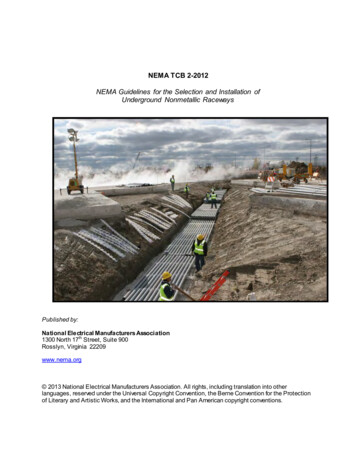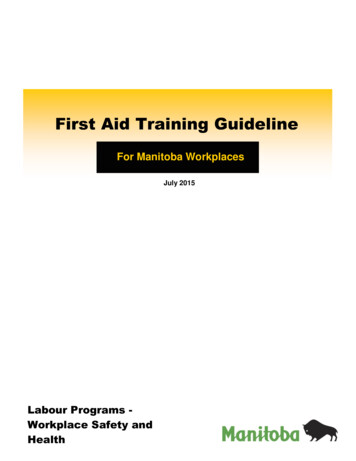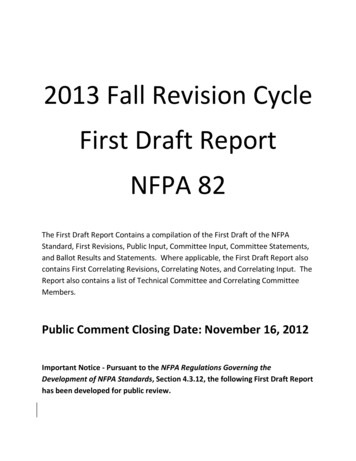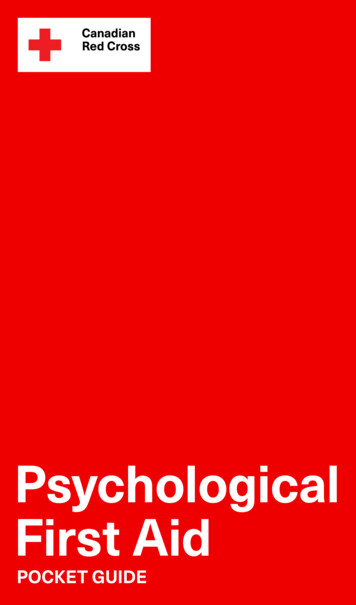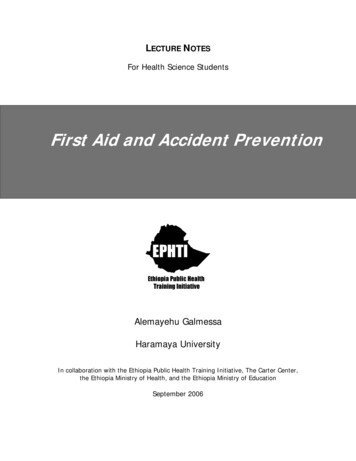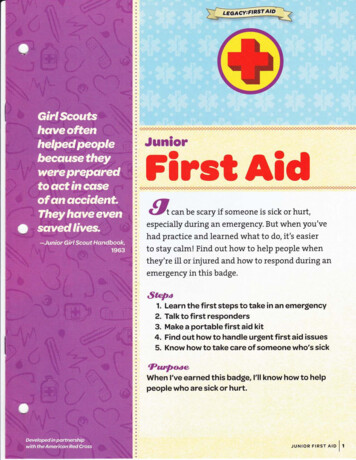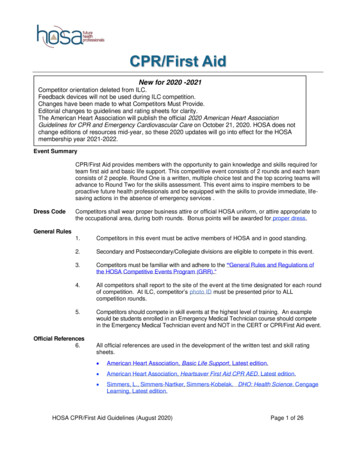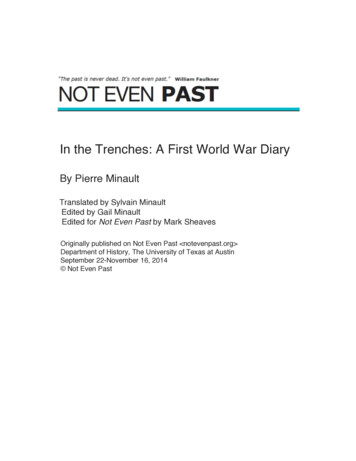
Transcription
In the Trenches: A First World War DiaryBy Pierre MinaultTranslated by Sylvain MinaultEdited by Gail MinaultEdited for Not Even Past by Mark SheavesOriginally published on Not Even Past notevenpast.org Department of History, The University of Texas at AustinSeptember 22-November 16, 2014 Not Even Past
In the TrenchesPierre Minault’s Diary of the First World WarNot Even Past is marking the centennial of the outbreak of the first World Warwith a very special publication. Our colleague, Gail Minault, a distinguishedprofessor of the history of India, has given us her grandfather’s diary, a near dailyrecord of his experiences in the trenches in France. Pierre Minault made his firstdiary entry on this very day, September 22, one hundred years ago, in 1914. Wewill be posting each of his entries exactly one hundred years after he wrote them.You will be able to follow Pierre’s progress and read his thoughtful and movingpersonal observations of life on the front as day follows day.Sylvain Minault originally translated the diary from French. Gail Minault editedthis translation and added the following introduction. We are extremely grateful toher for sharing her grandfather’s diary with all of us.IntroductionBy Gail MinaultThis year we commemorate the outbreak of World War I, which began in August1914, with all the powers of Europe declaring war on each other in a dominoeffect born of alliances and ententes. Reading the history of the war, onebecomes aware of the carnage, the stalemate, the sacrifice of an entiregeneration of young men to great power politics. In August of 1914, none of thatwas apparent. In fact, there was a certain insouciance in the air, and a sense thatit would be a short war. Austrians were going to make quick work of Serbia, theGermans thought they would be in Paris in a few weeks. The French lookedforward to winning back Alsace-Lorraine and marching into Berlin by Christmas.Such optimism seems unimaginable in hindsight.Winston Churchill, in a prescient statement made a few months after he becamea Member of Parliament in 1901, noted that: “I have frequently been astonishedto hear with what composure and how glibly Members, and even Ministers, talk ofa European war.” He went on to say that in the past, European wars had beenfought “by small regular armies of professional soldiers,” but in the future, when“mighty populations are impelled on each other,” a European war could only end“in the ruin of the vanquished and the scarcely less fatal commercial dislocationand exhaustion of the conqueror.” He warned that: “The wars of peoples will be2
more terrible than those of kings.”1 Churchill had fought in the Boer War, acolonial war unlike most – those fought against poorly armed native populations.The Boer settlers were Europeans and had comparable arms to their British foes,and that war had been bloodier and less conclusive than the British hadanticipated. Churchill’s warning was unheeded at the time. At the Admiralty in1914, Churchill realized that this war would be neither short, nor easy.The Germans smashed through Belgium in the opening month of the war, butthen were turned back from their drive toward Paris in the battle of the Marne. ByOctober 1914, the war settled into the trenches of northern France, with artilleryduels that chewed up horses and men like so much raw meat, and destroyedvillages and crops in the fields.French troops in Argonne (Bibliothèque nationale de France)Among the soldiers was my grandfather, Pierre Paul Antoine Minault, 26 yearsold, the father of two, a Sergeant in the 43rd French Colonial Infantry. He kept apocket diary that described his experiences. He was educated, sensitive, andarticulate, with a great appreciation for the beauty of the French countryside, andgreat sorrow at the devastation caused by the war.Pierre wrote reassuringly to his wife, Dora, who was English, living in England onMartin’s Farm, a small property that they had rented near Grately, Hampshire.1Cited in Martin Gilbert, The First World War: A Complete History (NY: Henry Holt, 1994), p. 3.3
There they were raising their two sons: my father, Paul – born in France – thenaged five, and his younger brother, Sylvain – born in England – who was twowhen Pierre was called to war. During a break in the fighting in mid-October, hesent her a post card. The picture on the reverse is of Bournemouth Beach, aplace they had enjoyed together, taking the boys there to play in the sand, andwhich he remembered eceivednothingwhateverasletters usandkissesfromyourlovinghusband.There are many personal memoirs of that war, and my grandfather’s is anexample of the genre that is, perhaps, in no way exceptional. And yet his pocketdiary, written in French and translated here into English, helps humanize theexperience of the war, the fear and the sound of guns, along with the tedium, themud, the rumors, the occasional decent meal, or cigarette, or shot of brandy.Such personal documents by ordinary people provide the raw materials for thewriting of history. My grandfather was just a solder trying to do his job, hoping tostay alive to return home to his family, like so many participants in wars beforeand since.4
Pierre Minault (courtesy of Gail Minault)September 22, 1914 – We do not know where weare goingWe leave Montrouge [a suburb of Paris] at 9 o’clock in the morning, and arrive atthe Gare de Lyon* at noon. The crowd of Parisians is generous and friendly. Theknapsack seems heavy to begin with, holding two days’ worth of food. We do notknow where we are going. The train travels relatively rapidly until Laroche, wherewe drink a bowl of hot soup.5
Reservists at Gare de L’est, Paris, 1914In the evening, I have to intervene in a compartment where a man who is totallydrunk threatens his comrades with his knife; finally he calms down and goes tosleep.At one o’clock in the morning, we arrive in Dijon. The night has become verycold. We disembark and march across town to a different station. There, hotcoffee awaits us, but after drinking it, we have to wait in the open for three orthree and a half hours before our departure. There was a captured German busthere, and a tent with nine wounded Germans, badly shot up by our 75s,** andquite a few of our sick men, evacuated from the front because of the cold weatherof the last few days. We leave again towards the North and arrive at daybreak atIs-sur-Tille. We scatter in the surroundings looking for breakfast; we eat anddrink coffee, and I get to wash myself, which refreshes me considerably.* one of several railroad stations in Paris**A reference to the famed 75 mm French cannon, a field piece which was superior tothe German 77 mm gun in range and accuracy.September 23, 1914 – Oh, the hazards of war!Oh, the hazards of war! After having traveled sixteen hours to reach here with our6
300 men, we get back on the train – direction Paris. This redeployment towardsthe French left wing appears rather general, judging by the number of troop trainsleaving in that direction.*First trains of mobilization (Bibliothèque nationale de France)* After its defeat at the Battle of the Marne, the German army retreated and tried toswing around the French left wing hoping to prevent French and British armies fromjoining. This was known as the Race to the Sea. The maneuver was ultimatelyunsuccessful.September 24, 1914 – Battle cattleReturn from Is-sur-Tille to Le Bourget (northeast of Paris). The trip: fifteen hoursin cattle-cars. Mine had forty men, several of whom were half drunk, and with theencumbrance caused by knapsacks, equipment, and rifles, one distinctly has theimpression that soldiers, in wartime, are cattle, battle cattle, it is true, but cattle allthe same. I ended up sleeping an hour or two. We have been here at Le Bourgetsince 5:00 in the morning and it is now 1:00 pm. The train is awaiting a fooddelivery.7
German soldiers in a railroad car on the way to the Western Front (Wikimedia Commons)The sun is warm during the day, but how cold it is at night, especially sleeplessnights! The food consists entirely of tinned meat and bread and somewhat lacksvariety; however it is sufficient. I chatted with artillery men coming back from thefront. Their advice might be quite helpful.September 25, 1914 – We feel revivedWe finally arrive at our destination of Ailly-sur-Noye in the Somme.* The nightwas very cold, but a big fire warmed us up as well as the coffee. We feel revived.The sun rises over this beautiful valley. In the distance canon fire thunders.8
Stabilization of Western Front, 1914 (Wikimedia Commons)*France is divided into administrative districts called “departments,” usually denominatedby a specific geographical feature; for instance the river Somme flows through thedepartment of La Somme. The administrative central town of the department is the“préfecture.” Smaller administrative centers are “sous-préfectures.”September 26, 1914 – Oh, such voluptuousness!!Yesterday we rested the whole day in the village of Ailly-sur-Noye. We expectedan alert during the night, but it didn’t happen. We slept on straw in an olduninhabited shack, and as it has happened for the last several days, I woke upwith my feet numb because of the cold.Departure at 7:00 am. Our formation consists of the 17th light infantry regimentand us [the 43rd Colonial infantry regiment] and stretches out along the roadwhich climbs to the plateau. This poor overworked, beautiful French road, with itscentral rib of granite and its two flanking ranks of trees is bearing up valiantlyunder the enormous war traffic. Ever since we left, the canons roar ceaselessly inthe distance. It sounds like the approach of a summer storm. It comes from overthere beyond Péronne, retaken the day before yesterday by our troops in spite of9
the resistance of the enemy’s right wing. I admire in passing the beautifulcountryside of Picardy. The enormous quantity and size of the haystacks showsthe fertility of the soil. There are undoubtedly a lot of weeds here and there, andalso the fields lack the precision in shape which we in England insist upon.French troops rest after a soup break, 1917 (worldwaronecolor.com)Here we are in the 4th rest period. The cannon thunder becomes more preciseand less like a rolling continuous roar. We have passed through Moreuil and arenow on the road to Doullens, the sous-préfecture of the Somme. We have justpassed a wheat field of some 10 hectares [25 acres], which promised amagnificent harvest, but where a cavalry detachment encamped all over theplace; it is now an indescribable mess, and the farmer’s loss must be enormous.In the evening we arrive in Arancourt. The Prussians have gone through hereand have swiped everything. After a long search, I managed to buy a goose andan enormous rabbit for my men, which were quickly executed and plunked intothe pot. And then, while chatting with a pleasant local lady, I arranged to get aroom for the night and a bed with sheets! Oh, such voluptuousness!! The room isnice and clean, but the Prussians have torn out the window and the casing, whichis propped up against the wall. How can those people have the desire, the sense,and the energy for such destruction?10
September 27, 1914 – There are fires everywhereThe cannon thundered all night, lighting up the horizon with short bursts of light.That did not prevent me from sleeping like a log in my feather bed with whitesheets. As there was no immediate departure order, I was left to sleep until 7:00am and got the best night’s sleep since my mobilization. This morning, eachsquad was issued two geese, two ducks and two chickens. Mortancourt: It isbeginning to feel like a battlefield; the wounded, bloody and summarilybandaged, return in long columns from the front; those more seriously woundedare brought back in Renault limousines, in horse-drawn carts, or farm wagons.They tell of their experiences this very morning. The German heavy artillery didthe most damage, but altogether few dead. Here is a wounded Bavarian, sad butcomposed, plus some others in a cart. One wounded Zouave* horseman with amuscular arm dripping with blood, passed by, his horse led by a white-haired oldwoman. They tell us of a convoy of German prisoners. All along the road thereare individual foxholes dug on the sides. But altogether the news is good. Anarmy corps is arriving as reinforcements.German prisoners in a French prison camp 1917-1919 (Wikimedia Commons)We arrive at Bray-sur-Somme. Here the battlefield spreads out in a vast11
panorama. The entire eastern horizon is gray with smoke. There are fireseverywhere. White puffs of smoke appear all of a sudden over the field; they areour shell bursts. Nearer us, black shell bursts; they are theirs. Close by,policemen guard a Prussian officer, a tall man, ramrod straight, self-assured inhis greatcoat. Our colonial soldiers shove each other to approach him yellingtheir hatred. The Prussian recoils into the haystack for protection. Some distanceaway, a Blériot airplane has landed. All of a sudden, its motor roars and theBlériot takes off, and climbs almost vertically into the beautiful blue sky. It fliestowards the horizon, there where a white shell burst appears. All of a sudden itreappears and lands in the field from which it took off. Our shell bursts advancefurther away toward the north. Is the enemy trying to outflank us to the north?The evening is magnificent. An autumnal breeze, exquisitely soft, sweeps overthe fields. Why must it be that in this marvelous area, everything reeks of themost awful destruction? But here is precisely the answer: this land of milk andhoney stirred the envy of the German. Its incalculable value will only strengthenthe will to hold on to it.At 5:00 pm, we arrive at Bray-sur-Somme. The battlefront up the hill is only about4 to 5 kilometers distant. Battle vestiges: crowded ambulances, heaps ofknapsacks, cartridge-belts, water bottles gathered up from the battlefield. Eachobject denotes a dead or wounded man.Our encampment is here in a corner of the little town. Quickly we peel potatoesand prepare some soup. As for me I go looking for a room and a bed, which I findwithout trouble. The evening is spent drinking coffee and then tea with ourhostess, a very fine woman, and with other soldiers. We chat, sing songs, eachone tells of his memories and experiences. Our good hostess listens, impressedby stories of England, of America. It was thus that the ancient Gauls prized theirguests who told of faraway travels.At 9 o’clock, I go to bed, all refreshed. Today’s distance covered: 16 to 18 kms.*A French colonial soldier, distinguished by his colorful uniform.September 28, 1914 – Everybody outside, inbattle dressHardly was I in bed and beginning to feel its warmth and go to sleep, than Ibelieve I hear a voice, a peremptory order coming from outside in the street, andas if getting an electric shock, I jump out of bed: “Everybody outside, in battledress,” says the voice. In two minutes I am outside, equipped with my knapsackon. My squad bumps into each other in the narrow stable where we were12
encamped; the men feel for their packs and their guns. The shadows arecounted, the captain swears and grumbles. Finally we are ready. In silence thecolumn starts out. We renew our advance toward the canon thunder.En route, I distinguish shadows in the grass in the ditch. I see an artillery manstretched out on his back, his comrades unbuttoning his jacket. I hear theraucous squeal of his rapid breathing. We pass on. A hundred meters further on,heart rending shrieks pierce the air; it is the man over there in the wet grass whocries out in his pain. This time I am choked with emotion. The sight of the woundsof those young men lying on stretchers, that’s nothing. But those horrible shrieks!We arrive at a charming hamlet, huddled in the poplars along the Somme. It isSuzanne, our stationing for the battle, the trenches are nearby.At midnight we lie down on the floor of the stable allotted to us. A bad night, coldand short besides, as we must get up at 3:00 am. We leave; we take 1000paces; we stop; we wait. At 9:00 am, we are still waiting; we are the reserves. Iwrite these notes, but the shells are coming nearer. They tear through the air.Will it be a short retreat on our part? We wait.French cavalry with German prisoners 1914 (Wikimedia Commons)“Vroom, vroom,” repeat our 75s on the nearest slope. German prisoners are overthere by the fire station. I go over to glance at them to take my mind off the battle;they are all deeply asleep.13
11 o’clock, the shell bursts come nearer, without our paying much attention,when all of a sudden, as I was looking at the evacuation of a German woundedman, I am struck as by the hiss of a viper. Instantly and as by a reflex, I flattenmyself on the ground and at the same moment a formidable noise, as if lightningstruck the nearby house, shatters the air. I feel myself, but all is well, and get up,and notice a piece of tile roofing fall just next to me. I hasten to rejoin my squadamidst a certain confusion, it is our first baptism of fire. We are ordered toevacuate the village and to regroup some 200 meters further back. A horse of theunit that has followed us passes by, leaving a trail of blood. A piece of shrapnelmust have hit him. Finally, we install ourselves in a former chalk quarry and therewe eat with a good appetite and get ready to make coffee.We notice that the shelling is getting closer.September 29, 1914 – He sleeps his last sleepWe left our encampment last night at 9:00 pm, to go rejoin the front line. Butbefore leaving, I was able to witness a real battle from our trench. This spectaclewas not really picturesque, as from time to time the German shells come burstingalmost among us, but already we seem inured to war. The puzzling aspect of amodern battle is how little one can see in proportion to how much you can hear.A battery comes out of one wood and goes to hide itself quietly in another. Aminute later, a clear line of four shell bursts methodically sprays the enemy. Onthe horizon, a black line advances; it is our men spread out in shooting formation.A shell bursts among them, momentarily breaking the line. This morning thevillage of Maricourt was shot up; the inhabitants have fled, the women weeping,having to walk twelve km. with their children in their arms.Nevertheless, over there, on the slope of the hill, three heifers ruminate totallyindifferent to the war, and at the bottom of the valley a shepherd slowly carriesthe barriers for the enclosure of his herd.Towards evening, after supper, we open up a haystack and spread out the hay tomake a momentary shelter and enjoy the sweetness of a short siesta. But at 9:00pm comes the call to assemble, and we leave. In the night, the long silent columnstretches out. In the middle of the road, shells have dug small craters, in whichwe risk stumbling. The fields have been ravaged by deep trenches, dugeverywhere. We arrive in a little valley near a cluster of trees. Our regiment, itseems, is to occupy this wood, which is bordered on all sides by shell-holes. Bymoonlight, one makes out dark splotches. A dead horse lies at the entrance tothe wood, which we enter in single file. An order is shouted: lie down along thepath. We curl up among the thorns and that is how we spend the night. The cold14
prevents me from sleeping. I shiver until morning, when a short slug of mintalcohol kindles a slight flame in my benumbed body.At reveille, the men are assembled; one or two are missing, doubtless lost in thisthicket. The sergeant-major of our company comes to look us over and takes usto meet our new comrades at the forward posts. Here is a group lying down withknapsacks on, facing the shelling. A shell has burst in that spot; the trees havebeen reduced to kindling. At the stump of one of those trees, one of our men iscrouching, but his face is blackened. He sleeps his last sleep. And it appears thathe is not the only one.French 87th Regiment at Verdun, 1916 (Wikimedia Commons)Noon: It seems as though things are going fairly well, for the shell-bursts seem to15
be moving further away. We have dug trenches and with this substantialprotection we feel more secure, and with each fall of a shell we no longer try toshrink our head into our shoulders. This wooded copse atop the cliff which looksout over the Somme River is simply charming. In normal times, it would be anideal spot for a picnic. Now, the noise would be somewhat annoying.One gets used to this continual zooming overhead of singing shells. I don’t eventhink of it any more. But it gets a bit annoying after a while. One is tempted toexclaim, “Oh, stop it up there,” or else: “Don’t throw any more, the yard is full up!”In short, adversaries put a lot of effort into lobbing shells at each other, but withvery little discretion.An artillery man passes by. We shout to him: “How goes it out there?” Theanswer: “Not too bad. We have just demolished two of their batteries, one of 77mm, the other of 105 mm. With our binoculars, we saw the aiming officer fly up,torn to pieces.”At 4:00 pm, we are showered by 77 mm German shells. They burst over ourheads in the tree branches, while the shrapnel sprinkles everywhere. Six orseven shells burst close enough to shatter branches over our heads. Meanwhilewe in our trenches stick our heads in our packs, like rabbits in their burrow. Thelieutenant comes around to see if there are any wounded. Happily there arenone. Now our guns retake the advantage, their detonations tear the air right andleft, and the skies fill with their whistles. We foot soldiers sit down in a circle andtake a brotherly drink of Byrrh, which restores our courage.September 30, 1914 – Monkey meatThe lack of sleep, the lack of heat, the lack of food begin to make their effectsknown. My fitness has lessened noticeably. To wake up each morning with armsand legs deadened by the cold, and the body by the cold wet ground, and tohave for daily food half a loaf of 10-15 day old bread, an egg-sized hunk of coldboiled beef, and one tin of “monkey-meat” [corned beef] for three men,afterwards to flatten oneself for hours, the knapsack on one’s head, whileshrapnel tears through the air and sends branches falling – all that doesn’t makeus happy, happy! To retain a bit of energy, at daybreak, fasting, we have theartificial “whiplash” of a mouthful of brandy or rum which the savvy ones manageto get in the area by scavenging in cafés. Because the comfort of a camp fire isstrictly forbidden, no flame shines in our little wood where our silent men sprawlmotionless as phantoms or cadavers.Last night the firing never ceased, shells and bullets whistled and purred throughspace. The strategic situation, as the official communiqué would put it, is16
unchanged. Yesterday, our regiment was to march forward to battle along withthe 41st Colonial; the 41st was to wait to advance on one wing, until the 43rd hadadvanced to the other. Both advanced at the same time, the one sustained byartillery fire, the other not! Result: many killed and wounded, of which manywere my comrades from the day before yesterday, as well as one of the captainsof our detachment, and the enemy did not retreat. It’s announced that an armycorps is to reinforce us May they get here soon!My thoughts wander to my home; to my wife and adored children. My wife sogentle, so lovely, so youthful, so loving; to my two boys, so lively, soimpressionable, so full of life. How far away they seem, strangers to the situationin which I find myself here, so quiet in their security at Martin’s Farm.Pierre Minault and family, 1914 (Courtesy of Gail Minault)Ah! If it were not for them, life would seem easy to sacrifice; shrapnel would be17
less cruel in its strident and raucous shriek. But for them I must live—until theend! Later if destiny wishes that I survive, how sweet and precious will be theintimacy of my home, the smile of my wife, the babble of my children. As for me, Iwould have the satisfaction of thinking that my peril, my sufferings, my efforts willhave contributed in slight measure to years of peace, prosperity, and tranquilhappiness which will result from Europe being unified by meeting the threat of theGermanic Hydra.*News arrives that an old woman and an old man from hereabouts have comehere to reveal to our artillery officers the position of the heavy artillery, which hasharassed us with impunity for the last three days. The battery is said to be in aquarry at some distance from here. The intelligence is good. But what couragefor this old couple to come under fire to reveal the position of the enemy to ourrange-finders!* A legendary many-armed monster.October 1, 1914 – No chocolate, ham, lard, milk,nothingHere we are on the 1 of October. Thus the war enters its third month. What has itgot in store for us?In order to write, I have come to sit on the rim of a shell crater a few meters fromour encampment. I came here not because I am foolhardy, but because thesun—a very pale sun—has penetrated the thicket here and gives some vigor tomy bones that are stiffened by the cold. Ah! The cold! What an adversary and sodifficult to overcome! And how much does the War Office concern itself withprotecting soldiers from it? Because since I have been here, I have slept on thebare ground, and I have nothing, absolutely nothing to cover my body. In spite ofnumerous complaints, I haven’t obtained even the hope of a blanket. “Take oneoff a wounded man” is the only answer I got. Already I have dysentery and lastnight was extremely difficult.Last evening, a happy diversion: I was able to go down to the little village, at thefoot of the cliff on which we are perched, which clings to the bank of the Somme,to lead the coffee detail. It is an almost perpendicular descent, which warmed meup. There all the inhabitants, still terrorized by the recent cannonade, had somehope revived, because a patrol of our regiment had just captured a Germanpatrol of 17 infantrymen who surrendered without resistance, and this event,together with the destruction of the enemy battery that was bombarding us for thelast several days, was balm to the hearts of these good people.18
A French soldier finds some time to write, 1917 (worldwaroneincolor.com)There is absolutely nothing in this village, nothing which resembles provisions.No chocolate, ham, lard, milk, nothing. The Boches* have taken everything,everything, everything – repeats everyone. Last evening a brave woman wouldhave gone to milk a cow for a bowl of milk for me, but there was a German shellin the stable which had not exploded, and she was afraid. All that remains isalcohol: gin, which was hidden away in houses at the approach of theBarbarians. Outside, all is calm. Yesterday morning around 11:00, there were afew salvos of shelling, but no damage, and since then the cannonade seemsfurther away.*Pejorative name for Germans.19
October 3, 1914 – Black holes in the chalky soilYesterday saw an interruption in our woodsy existence. We left our fort, thanks toa morning fog, and went back to the village of Suzanne, where four or five daysago, we were supposed to encamp. This diversion, of a day of rest, willundoubtedly to allow us to wash, shave, and to get some food to eat. The village(Suzanne) has badly suffered since our last visit; the countryside all around hasbeen torn up by shells, those huge German shells which dig big, black holes inthe chalky soil. Also in the village itself, many houses were destroyed or gutted. Afine farm in the middle of the village has burned to the ground, grilling the 18cows and 3 horses that inhabited it. Shrapnel has scarred or pierced bricks; slateand plaster are everywhere.Aerial view of ruins of Vauz France, 1918 (Wikimedia Commons)A few inhabitants stayed behind, hiding in the cellars when the shells fell, andcoming out when the shelling slacked off. A beautiful girl of around 12, already awoman, comes out of an old house in the middle of the destruction and smiles atme. “Well, well, young lady, aren’t you afraid of shrapnel?” – “Certainly not,monsieur,” answers the young girl, with a resolute air.There, certainly, is good human stock!We spend the afternoon in the park of a sumptuous chateau where the staff of20
(our) Army Corps resides. It is a beautiful park where our passage caused muchdamage, not for the pleasure of destroying, but to create some shelter againstthe threatening rain. A corporal from our section and I constructed a sumptuoustent of branches, almost rain-proof, and spread it with fresh straw. However, wewere quickly ordered to leave this cozy shelter to rejoin the billeting for the night.This is in the workshop of a worthy blacksmith. The bellows are quickly put togood use and in no time at all, the coffee is foaming, cabbage is cooking, thesteaks are grilling. When the fires are put out, the shop is turned into asumptuous dormitory, and sweet sleep closes this day of frenetic debauch!In the morning, before daybreak we get back to our little wood, while in thedistance the cannonade gets further and further away.Yesterday, an artillery warrant-officer told me: “The Russians are in Berlin. It’sofficial.” I just don’t believe it, but if it were only true, our trials would certainly beshortened.An artillery soldier gave me more probable news: Yesterday, he told me that wedestroyed 18 enemy
This year we commemorate the outbreak of World War I, which began in August 1914, with all the powers of Europe declaring war on each other in a domino effect born of alliances and ententes. Reading the history of the war, one becomes aware of the carnage, the stalemate, the sacrifice of a



